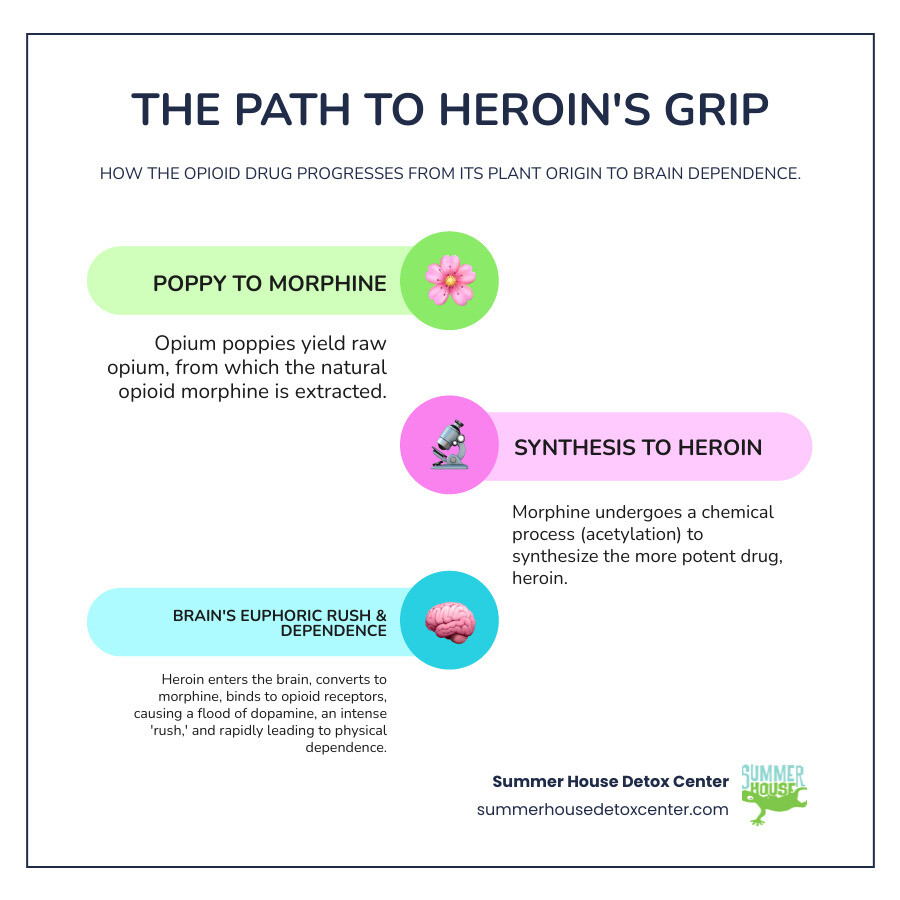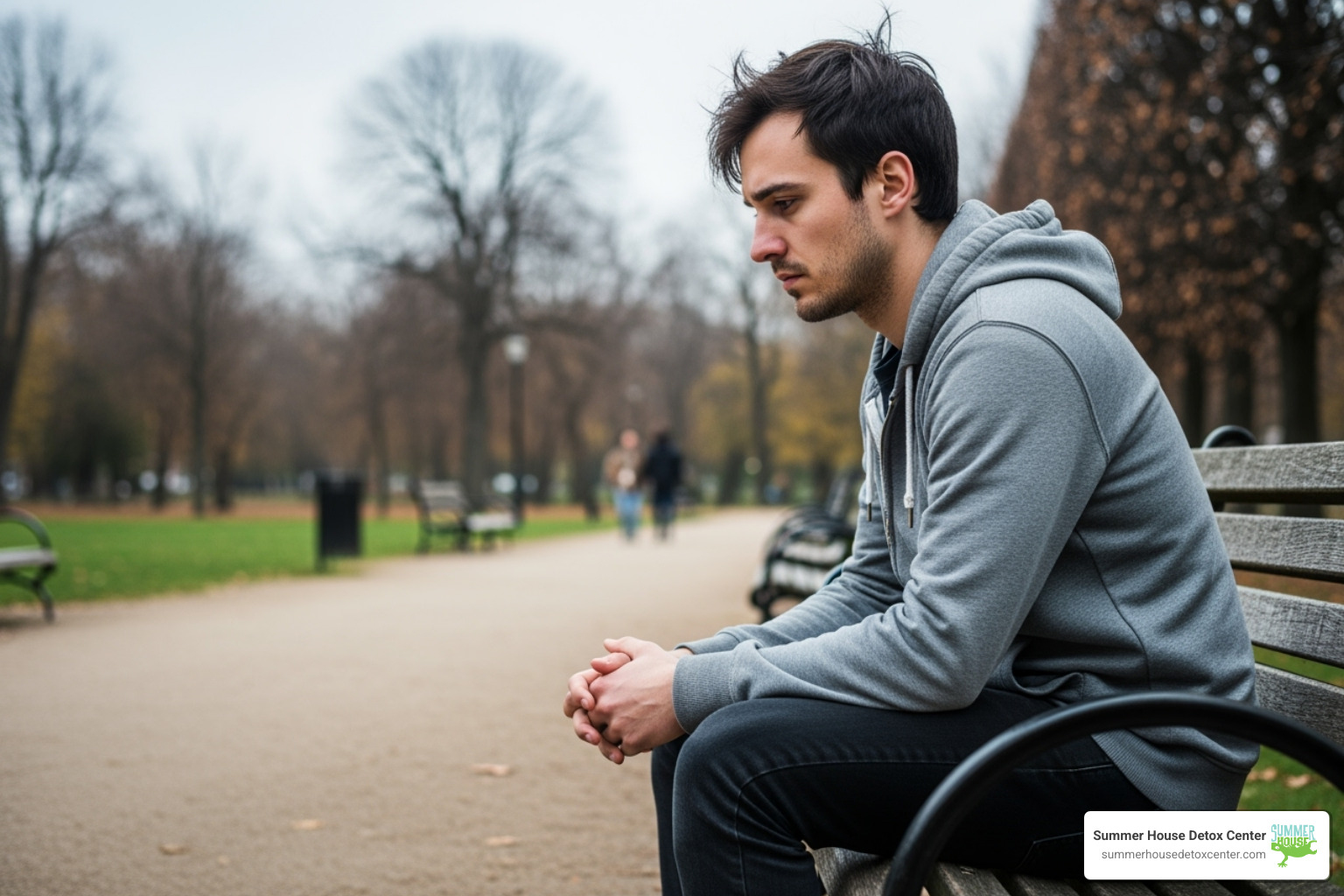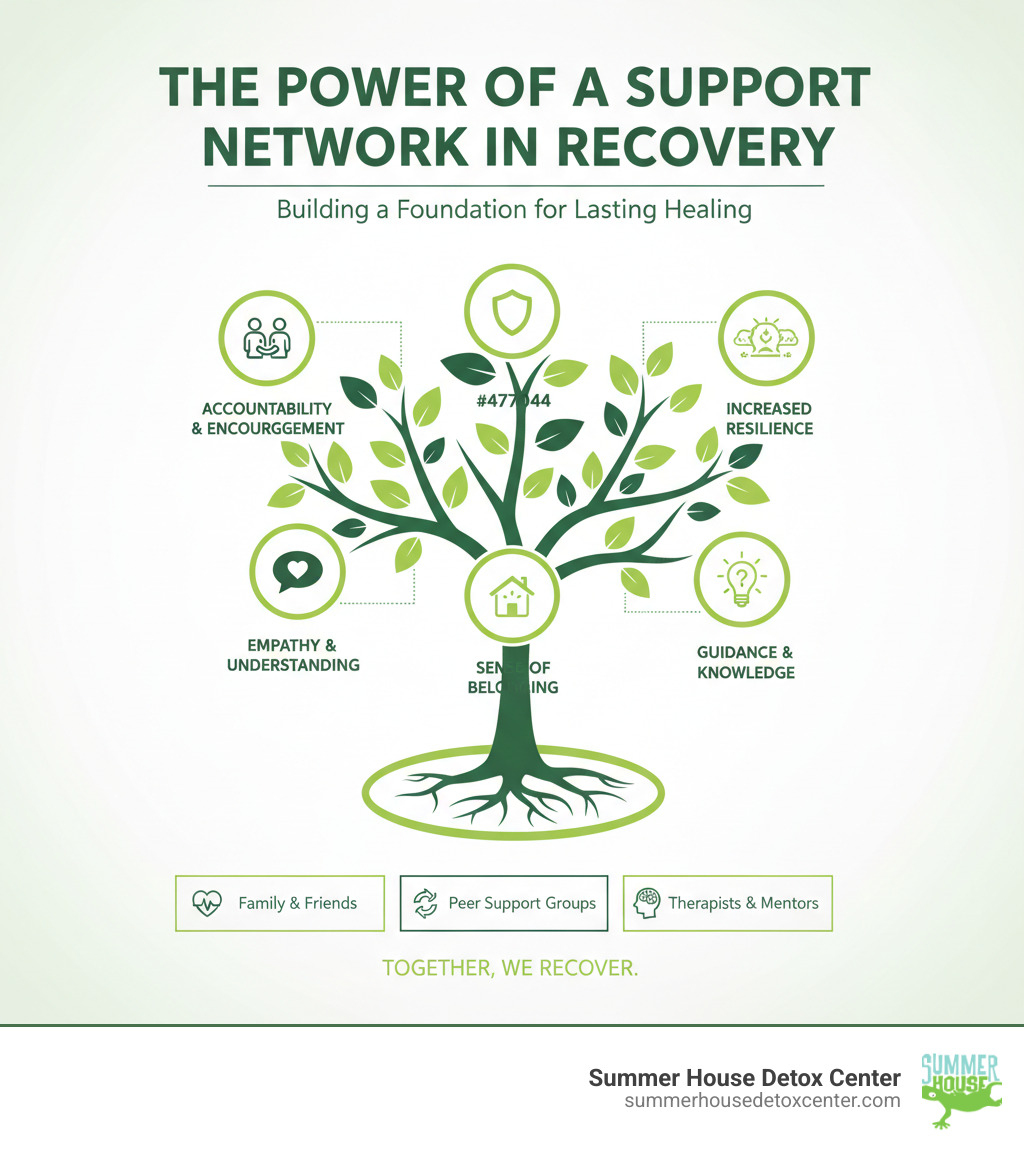Finding Hope in the Fight Against Heroin
Heroin addiction help is available right now. Recovery is possible with the right support. If you or a loved one is struggling with heroin addiction in Miami or anywhere in Florida, these are your immediate next steps:
Immediate Actions for Heroin Addiction Help:
- Call a 24/7 helpline – SAMHSA’s National Helpline at 1-800-662-4357 provides free, confidential treatment referrals.
- Seek medically supervised detox – Withdrawal can be dangerous without professional monitoring.
- Consider medication-assisted treatment (MAT) – FDA-approved medications reduce cravings and ease withdrawal.
- Connect with behavioral therapy – Therapies like CBT address the root causes of addiction.
- Join support groups – Narcotics Anonymous and SMART Recovery offer vital peer support.
- If overdose occurs – Call 911 immediately and administer naloxone if available.
Heroin is a powerful opioid made from morphine with an extremely high risk of addiction. It creates an intense “rush” by flooding the brain with dopamine, and nearly one million Americans have used it in the last year. Its grip can feel impossible to break due to severe withdrawal symptoms and overwhelming cravings.
But here’s what matters most: recovery is real, and help is available. Thousands of people in Florida overcome heroin addiction every year through evidence-based treatment. You don’t have to do this alone. Professional treatment centers in Miami offer specialized programs to keep you safe and supported on your recovery journey.

Understanding Heroin Addiction: Signs, Risks, and Effects
Heroin addiction affects not just the user, but everyone who cares about them. Recognizing the warning signs is the first step toward finding heroin addiction help for yourself or someone you love.

The Telltale Signs of Heroin Addiction
Many families in Miami tell us they wish they’d recognized the signs earlier. Look for these changes:
- Physical signs: Constricted (pinpoint) pupils, frequent itching, sudden weight loss, nodding off at odd times, slurred speech, poor hygiene, and track marks (scars or scabs) on arms or legs from injection.
- Behavioral changes: Becoming secretive and isolated, neglecting work or school responsibilities, unexplained financial problems or missing valuables, and a sudden change in friends.
- Psychological shifts: Unpredictable mood swings, increased depression or anxiety, impaired judgment, loss of interest in hobbies, and defensiveness when confronted about drug use.
- Paraphernalia: Finding needles, burnt spoons, small bags with powder residue, cotton balls, or rubber tubing are clear indicators of heroin use.
The Stages of Addiction
Addiction is a progressive disease. Understanding these stages helps explain how use can become compulsive.
- Initial use: Often begins out of curiosity, peer pressure, or as a cheaper alternative to prescription painkillers.
- Regular use: Use becomes more frequent as the person seeks the temporary relief it provides. Tolerance builds, requiring more of the drug for the same effect.
- Risky use: Drug use begins to cause negative consequences, such as driving under the influence or problems at work or in relationships.
- Dependence: The body adapts to the drug’s presence. Stopping causes intense withdrawal symptoms and psychological cravings.
- Addiction: The person compulsively seeks and uses heroin despite severe consequences. It is a chronic disease that requires professional heroin addiction help.
Immediate and Long-Term Risks
The risks of heroin use are severe and wide-ranging.
- Immediate Health Risks: The most significant immediate risk is overdose, which is increasingly deadly due to fentanyl-laced heroin in Florida. An overdose slows or stops breathing, leading to coma and death.
- Long-Term Health Consequences: Chronic use leads to collapsed veins, organ damage (kidney, liver, lungs), and life-threatening heart infections. Sharing needles dramatically increases the risk of contracting HIV and Hepatitis C. Our page on Opiate Withdrawal Symptoms details what happens when the body is deprived of the drug.
- Social and Economic Impacts: Addiction devastates families, destroys relationships, and leads to job loss and financial ruin. In Florida, legal issues from possession can create long-term barriers to employment and housing.
- Brain and Body Changes: Heroin rapidly alters brain chemistry, changing the brain’s reward system and impairing functions like impulse control. Physical dependence means the body needs the drug just to feel normal.
- Risks During Pregnancy: Babies exposed to heroin in the womb can be born with Neonatal Abstinence Syndrome (NAS), a painful condition requiring specialized medical care. Learn more about what happens to babies exposed to heroin in the womb.
While these risks are serious, they can be managed with the right treatment. Recovery is possible, and thousands in Miami and across Florida are proof.
The Path to Recovery: A Guide to Heroin Addiction Help
Heroin addiction is a treatable disease. Recovery happens every day for people who felt hopeless, including many right here in Miami. Seeking professional heroin addiction help is a brave choice for life.
Benefits of Professional Help
Trying to quit heroin “cold turkey” is not just difficult; it can be medically dangerous. We explain this in detail on our page about The Importance of Medically Supervised Detox: Why DIY Detox Can Be Dangerous.
Professional treatment provides what you can’t get at home: 24/7 medical supervision, medications to ease withdrawal, and a safe environment to focus on healing. Effective treatment is personalized to your unique history and needs.

The First Step: Medically Supervised Detox
Detox is often the most feared step. Heroin withdrawal is difficult, with symptoms like intense body aches, nausea, and vomiting starting within 12 hours of the last use. However, in a medically supervised detox, you do not have to suffer unnecessarily.
At Summer House Detox Center in Miami, our medical team monitors you 24/7. We use FDA-approved medications to manage symptoms, ensuring you are as safe and comfortable as possible. A safe detox gives you the energy to focus on your future. Learn more about our Heroin Detox Center and how someone can come off heroin safely. You can also read about The Science of Detox: How Your Body Eliminates Toxins During Recovery.
Medication-Assisted Treatment (MAT)
After detox, Medication-Assisted Treatment (MAT) is a powerful tool for recovery. It combines FDA-approved medications with therapy to treat the whole person. These medications work by targeting opioid receptors in a controlled way to reduce cravings, prevent withdrawal, and block heroin’s euphoric effects.
The three main medications are:
- Methadone: Prevents withdrawal and cravings.
- Buprenorphine (e.g., Suboxone): Reduces cravings with a lower risk of misuse.
- Naltrexone (e.g., Vivitrol): Blocks opioids from having an effect.
Combined with therapy, MAT dramatically improves the chances of sustained recovery. For more details, visit our Opiate Detox Treatment page.
Essential Behavioral Therapies for Heroin Addiction Help
Medication addresses the physical side; therapy addresses the psychological roots of addiction. It’s crucial for understanding what drives Addiction and learning new coping skills.
- Cognitive-Behavioral Therapy (CBT) helps you recognize and change the thought patterns that lead to drug use.
- Dialectical Behavior Therapy (DBT) teaches skills for emotional regulation, distress tolerance, and mindfulness.
- Contingency Management uses positive reinforcement to encourage healthy behaviors.
- Trauma-Informed Therapy provides a safe space to process past trauma that may contribute to substance use.
Combining medication and therapy provides the strongest foundation for a life free from heroin.
Levels of Care and Building a Sober Life
After detox, the next step is finding the right level of care to build a life in recovery. Heroin addiction help is not one-size-fits-all; it’s about finding what you need to heal.

Choosing the Right Level of Care in Florida
An assessment of your unique situation—addiction severity, mental health, and home environment—will determine the best path.
- Inpatient Rehabilitation: This offers the most structured support. You live at the facility, free from triggers, with 24/7 medical and clinical support in an immersive environment focused on healing.
- Outpatient Programs: These allow you to live at home while attending treatment. A Partial Hospitalization Program (PHP) is the most intensive, with treatment several hours a day, most days of the week. An Intensive Outpatient Program (IOP) requires fewer hours, offering more flexibility.
At Summer House Detox Center, we provide medically supervised detox in Miami and guide you to the next appropriate level of care. Explore our Drug Detox Facilities, learn about Drug Treatment Centers in Florida, and see our specific Miami Rehab services.
Maintaining Long-Term Recovery After Treatment
Recovery is a lifelong journey that begins after formal treatment ends. Success depends on strategy, not just willpower.
- Relapse Prevention: This involves identifying personal triggers and developing a plan to manage them with healthy coping strategies like exercise, mindfulness, or calling a sponsor.
- Support Network: Building a strong network of supportive family, friends, and peers in recovery is crucial for accountability and encouragement.
- Aftercare Plan: Before leaving treatment, you’ll create a roadmap for recovery. This may include ongoing therapy, MAT, support groups, and a stay in a sober living home.
Understanding What is addiction is an ongoing process that empowers your recovery.
Finding Support Systems for Heroin Addiction Help
Connecting with others who understand is a powerful part of recovery. Key support systems include:
- Narcotics Anonymous (NA): A 12-step fellowship where members share experiences to help each other stay clean. You can Find Local NA Meetings in Miami and throughout Florida.
- SMART Recovery: A self-empowerment program that uses evidence-based tools to help individuals manage their recovery.
- Family Support Programs: Groups like Al-Anon and Nar-Anon provide support for loved ones, helping them heal and learn how to support recovery effectively.
With the right care and support, you can build a life beyond addiction.

Frequently Asked Questions about Heroin Treatment in Florida
When seeking heroin addiction help, it’s normal to have questions. Here are honest answers to what we hear most often from people in Florida.
How long does heroin detox and treatment take?
There’s no single timeline, as everyone’s journey is different.
- Detox: Physical withdrawal symptoms typically start within 12 hours, peak in 2-3 days, and subside after about a week. Psychological symptoms like cravings and anxiety can last longer. Our Opiate Detox Program is designed to manage these symptoms safely.
- Treatment: While 30-day programs exist, research shows that longer stays of 60 to 90 days often lead to better long-term outcomes. The right duration depends on addiction severity, co-occurring mental health issues, and individual progress.
Will my insurance cover heroin addiction treatment in Florida?
Yes, most insurance plans cover heroin addiction help. The Mental Health Parity and Addiction Equity Act (MHPAEA) requires insurers to provide comparable coverage for substance use disorders as they do for other medical conditions.
Specifics like in-network vs. out-of-network costs will vary by plan. Our team at Summer House Detox Center can verify your coverage and explain your benefits clearly. Don’t let cost be a barrier to getting help. Contact Us, and we’ll help you explore your options.
How can I help a loved one in Miami struggling with heroin addiction?
It’s heartbreaking to watch a loved one struggle. While you can’t force them into recovery, you can be a powerful, positive influence. Here’s how:
- Offer support without judgment. Approach them with compassion, expressing your love and concern.
- Educate yourself. Understanding addiction as a disease, not a moral failing, will help you respond more effectively.
- Set healthy boundaries. This means not enabling the addiction (e.g., giving money) while still supporting recovery efforts.
- Seek professional guidance. An interventionist or addiction specialist can provide advice on how to approach your loved one.
- Encourage family therapy. Addiction affects the whole family. Therapy can help heal relationships and build a supportive environment for recovery.
- Find support for yourself. Groups like Al-Anon or Nar-Anon offer a safe space for families to share their experiences and find strength.
Take the First Step Towards Recovery in Miami
Reading this page is a meaningful step. It represents the courage to imagine a different future, free from addiction. We want you to know that future is possible.
Addiction is a treatable disease, not a moral failing. With the right support, recovery is happening every day for people in Miami and across Florida. Taking action today matters. Every moment is an opportunity to choose a new path.
At Summer House Detox Center, our Miami facility offers personalized, medically supervised detox that prioritizes your comfort and dignity. Our experienced staff, many of whom are in recovery themselves, provide genuine empathy and unwavering support. They understand what you’re going through from lived experience.
Beginning your recovery in Florida offers a restorative environment combined with advanced medical care. You can learn more about Why choose Florida for Opiate Detox on our site.
You don’t need to have all the answers to start. You just need to take the first step. Our comprehensive approach to Heroin Detox provides the foundation for lasting change. The life you want is waiting. We’re ready to help you reclaim it.
Ready to take the first step towards a life free from heroin addiction? Contact us today to learn more about our comprehensive detox and treatment programs.
https://summerhousedetoxcenter.com/detox-services/heroin-detox/
